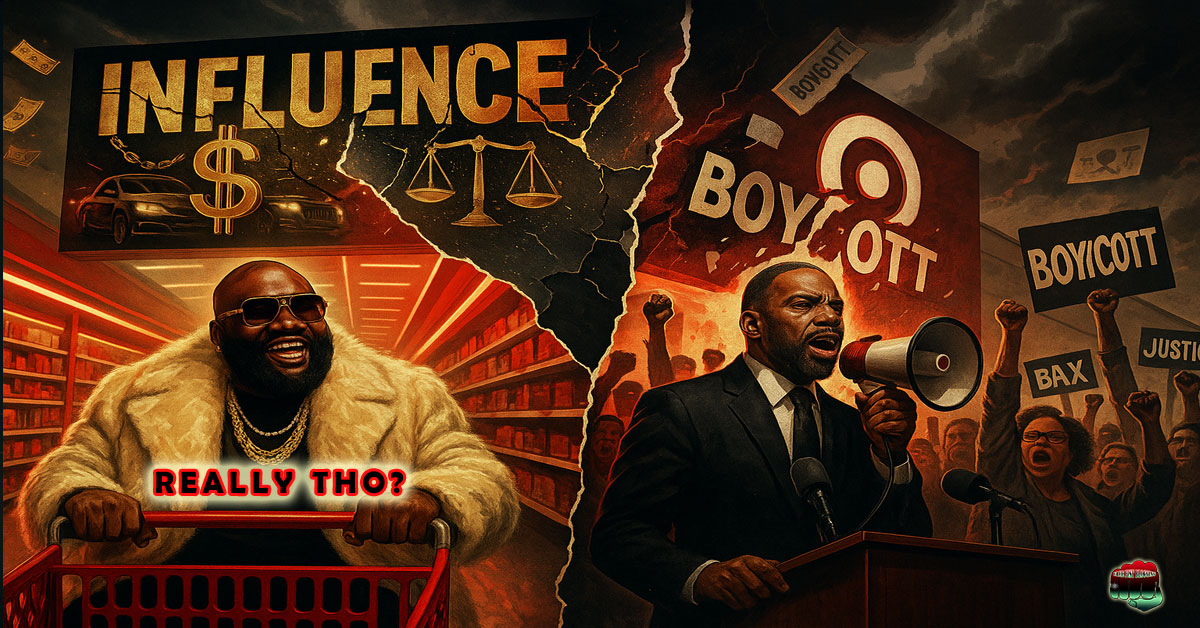By InnerKwest Editorial Team | Published August 27, 2025
A Playful Video with Serious Consequences
Rapper Rick Ross likely thought he was sharing a lighthearted moment when he filmed himself cruising through a Target store on a motorized cart, bantering with his girlfriend Jazzma Kendrick about kitchen appliances and cinnamon rolls. The clip, uploaded to social media, showed the couple jokingly referring to the ride as “kidnapping” and “riding dirty,” casting the scene as carefree fun.
But what looked like harmless entertainment quickly collided with a serious national boycott. Pastor Jamal Bryant — one of the leading voices challenging corporate America’s retreat from diversity, equity, and inclusion — saw the video as more than a quirk of celebrity lifestyle. For him and many others, it represented a disconnect between cultural influence and community responsibility.
The Boycott Against Target
At the heart of the controversy lies a growing movement against Target, which has faced criticism for rolling back commitments to diversity and inclusion initiatives. Pastor Jamal Bryant, known for his sharp advocacy on issues of racial justice and economic equity, has rallied thousands in protest.
Bryant and allied leaders have articulated specific demands for Target:
- Invest $2 billion in Black communities.
- Deposit $250 million in Black-owned banks.
- Form partnerships with at least six HBCUs (Historically Black Colleges and Universities).
- Rebuild its DEI framework rather than quietly dismantling it.
A petition backing these demands has garnered more than 350,000 signatures, signaling this is not just a passing flash of outrage but a sustained movement pressing for corporate accountability.
Jamal Bryant’s Challenge to Rick Ross
When Ross’s video surfaced, Bryant did not respond with hostility or cancellation rhetoric. Instead, he used the moment as a teaching opportunity. Speaking directly to the rapper on Instagram, Bryant reminded him of the unique cultural role he holds:
“You are an incredibly influential figure for the culture. Be the boss, not the pawn.”
That short but sharp message encapsulated the dilemma of celebrity influence. Ross is not merely a private citizen shopping at Target; his presence and playful promotion of the brand land differently because millions look to him as a trendsetter, entrepreneur, and voice in hip-hop.
For Bryant, Ross’s visibility could have been wielded to amplify community concerns. Instead, the video risked trivializing or undermining a coordinated boycott designed to extract serious concessions.
Community Backlash
The community response was swift and pointed. Social media filled with disappointment, frustration, and outright anger toward Ross’s apparent disregard for the boycott. Some recalled past moments where Ross seemed disconnected from grassroots movements:
- “We been boycotting Ross since he danced for Trump.”
- “Just shameful! All money ain’t good money.”
- “STOP EATING AT HIS WING STOPS! … THESE PPL ONLY UNDERSTAND MONEY!”
The backlash underscored a reality many celebrities underestimate: fans and communities increasingly expect their cultural leaders to act in alignment with collective struggles. When public figures ignore or sidestep these expectations, they risk being perceived as complicit, tone-deaf, or indifferent.
The Power and Pitfalls of Celebrity Influence
This episode isn’t only about Rick Ross. It raises a broader question: What is the role of celebrities in moments of collective action?
Celebrities often straddle two worlds: the glamorous sphere of wealth and privilege, and the cultural responsibility that comes from commanding a mass audience. Their endorsements can elevate brands, shape public opinion, and legitimize or delegitimize social causes.
When they are mindful, they can amplify community-led initiatives with unmatched reach. But when they are inattentive or dismissive, they can undercut the very movements that sustain the communities they claim to represent.
Ross’s Target video highlights how quickly celebrity influence can shift from entertainment to liability — not because of malicious intent, but because of the disconnect between personal action and collective struggle.
Economic Boycotts and the Question of Solidarity
Pastor Bryant’s boycott strategy reflects a tradition deeply rooted in Black history: using economic pressure to demand change. From Montgomery’s bus boycott in the 1950s to divestment movements in more recent decades, collective withdrawal of financial support has often forced institutions to confront issues they would otherwise ignore.
The Target boycott follows in this lineage, insisting that consumer dollars must reflect community values. When celebrities appear to disregard such efforts, they risk eroding the collective leverage that makes boycotts effective.
Ross’s misstep serves as a reminder that solidarity is not optional when entire communities are organizing for economic justice.
Lessons for Public Figures
The larger lesson here is clear: celebrity comes with responsibility. Public figures cannot afford to be uninformed about the contexts in which they operate. A simple shopping trip or social media post can carry consequences far beyond personal intention.
For cultural icons like Rick Ross, “staying neutral” in the face of community action is not truly neutral — it’s a statement in itself. Fans and communities read these actions as choices about allegiance, values, and solidarity.
As Bryant’s message makes plain, celebrities have the opportunity to be “the boss,” using influence to challenge institutions, amplify justice, and strengthen collective power. But if they fail to recognize that responsibility, they risk becoming “the pawn,” unwittingly reinforcing the very structures movements seek to dismantle.
Closing Reflection
Rick Ross’s Target video may fade from headlines in a few days, but the debate it sparked will not disappear so easily. Communities are watching, movements are mobilizing, and celebrities are being held to a higher standard.
The age of consequence-free influence is ending. Whether celebrities like Ross adapt to this reality — aligning their actions with the communities that built them — will determine not just their reputations, but the strength of the collective movements they are entangled in.
As Jamal Bryant reminded us: it’s time for cultural leaders to choose. Boss or pawn?
📌 InnerKwest will continue to follow developments in the Target boycott, celebrity influence on social justice, and the broader struggle for economic accountability.
Support InnerKwest: Powering Truth & Excellence with Bitcoin
At InnerKwest.com, we are committed to delivering impactful journalism, deep insights, and fearless social commentary. Your Bitcoin contributions help us execute with excellence, ensuring we remain independent and continue to amplify voices that matter.
Support our mission—send BTC today!
🔗 Bitcoin Address: 3NM7AAdxxaJ7jUhZ2nyfgcheWkrquvCzRm© 2026 InnerKwest®. All Rights Reserved | Haki zote zimehifadhiwa | 版权所有.
InnerKwest® is a registered trademark of Inputit™ Platforms Inc. Global
No part of this publication may be reproduced, distributed, or transmitted in any form or by any means without prior written permission. Unauthorized use is strictly prohibited.
Thank you for standing with us in pursuit of truth and progress!![]()


